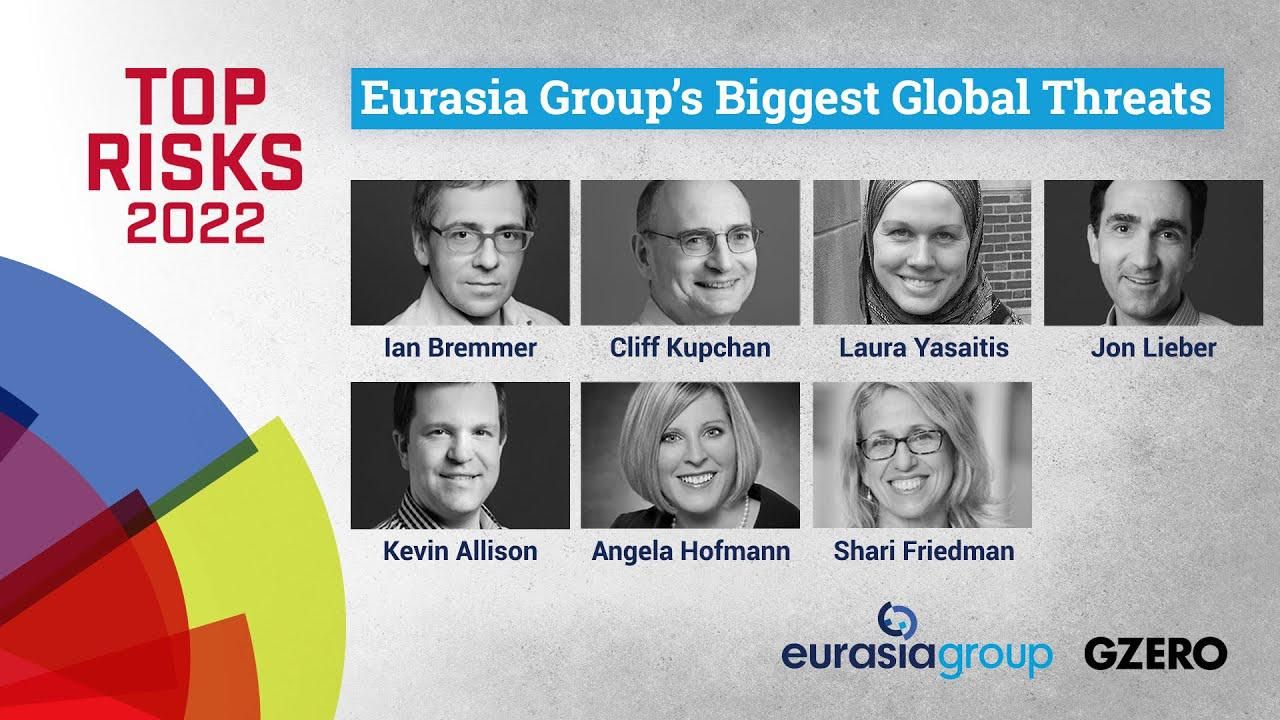Top Risks 2022: We’re done with the pandemic, but the pandemic ain’t done with us

Eurasia Group, GZERO Media's parent company, has just dropped its annual list of the top 10 geopolitical risks for 2022. Number one is that China's zero-COVID strategy will fail; number two is that we'll move closer to a "technopolar world" with Big Tech companies becoming more powerful than governments; and number three is dangerously divisive US midterm elections in November.
How will these and other 2022 Top Risks play out in today's G-Zero world? Several Eurasia Group experts joined a livestream discussion. Here are a few highlights from each.
Eurasia Group & GZERO Media President Ian Bremmer kicked off the conversation with stuff he thinks we won't need to panic about in 2022: COVID endemic in some places, US-China relations driven more by economics than politics, global democracy not as weak as many thought. He also pointed out that the downside to China having the strongest political governance of any major economy is sticking to a zero-COVID strategy that will prevent it from living with the virus for some time, the different types of American & Chinese tech giants, and why now it's unclear whether democracy is still the model that'll always beat autocracy.
Finally, Ian explained that the only way for multinational corporation CEOs to navigate the culture wars is to speak with both sides of their mouths, and mentioned some bad things Vladimir Putin may do in Ukraine to divide Americans and Europeans.
Eurasia Group Chairman Cliff Kupchan shared his thoughts on why today we live in a "geopolitical recession" created mainly by US political polarization and China's zero-COVID strategy. Xi Jinping, he added, could be in big trouble in 2022 because he faces a triple threat: the pandemic, political minefields that could upend Xi’s plans to stay big boss, and an economic slowdown. Kupchan also said that right now regulating Big Tech is impossible in the absence of a January 6-style event — and even that accomplished little in the US. In his view, American politics has become like an internal Cuban Missile Crisis that could soon explode. The question is, what, if anything, can be done about it at this point.
Laura Yasaitis, healthcare consultant at Eurasia Group, explained why China's zero-COVID approach won't work with the omicron variant. It won't be a catastrophe, she predicts, but expect the Chinese government to impose severe restrictions and play whack-a-mole with the virus. Meanwhile, Yasaitis believes things will soon get better in most rich nations, but developing ones will face the big risks of continued outbreaks and more mutations.
Eurasia Group geotech director Kevin Allison gave us a primer on the "technopolar world" — the rise of a handful of very powerful tech companies disrupting centuries of geopolitics led by the nation-state. Why? Because they've created a realm in cyberspace where they are more powerful than governments.
Kevin also offered his views on why the virtual world is now in even worse shape than the G-Zero world, why governments are only regulating the most superficial levels of tech power, and who will likely crack down the hardest on Big Tech this year.
Ahead of this week's first anniversary of the US Capitol insurrection, Eurasia Group's US Managing Director Jon Lieber analyzed what's changed since in American politics — mainly the strong belief that the 2020 presidential election was stolen, and lack of backlash against Donald Trump among the Republican base. How will that make the November midterms different this time? For one thing, he said Trump loyalists may get elected in key positions in swing states, so the former president could actually steal the 2024 election. What's more, Lieber added, whatever the result is, it'll be contested on both sides because some Democrats will cry foul over voter suppression if they lose in what has become a toxic environment for democracy.
Finally, Angela Hofmann, practice head for Industrial & Consumer at Eurasia Group, gave us a heads-up on how the world's most visible brands are in for a very rocky year because navigating culture wars will be very tricky, as will fighting often competing demands from consumers, employees, and regulators on things like China, diversity, and voting rights.- Top Risks 2022 - GZERO Media ›
- Cliff Kupchan: We need a national dialogue to save US democracy - GZERO Media ›
- Jon Lieber: What’s different about the 2022 midterms is 2024 Trump threat - GZERO Media ›
- Boris Johnson losing support of UK citizens and his own party - GZERO Media ›
- State of the World: On the verge of fragmentation? - GZERO Media ›
- 2022 has been rough. Will 2023 be any better? - GZERO Media ›
- Podcast: Trouble ahead: The top global risks of 2024 - GZERO Media ›